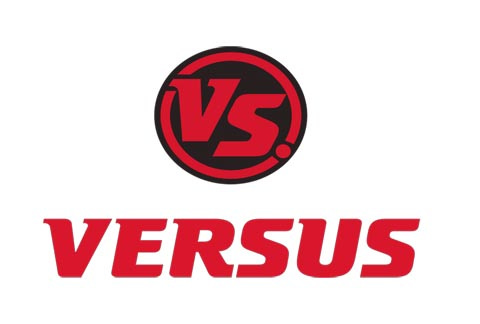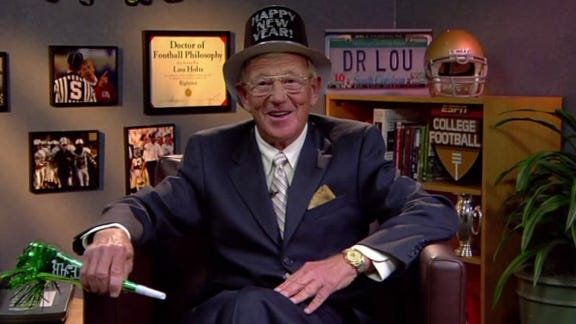What-If Wednesday: The Disappearance of Versus, Big East Football and Peacock
Turn on the TV during a college football Saturday in 2009, and you could catch a high-profile FCS game, a Big 12 shootout and the original incarnation of #Pac12AfterDark without having to change the channel — or without exposing yourself to Mark May and Lou Holtz.
As ESPN tightens its grip on college football, it’s maddening that the other media giants (ViacomCBS, NBCUniversal, Warner Media) have more or less punted the sport to Disney. NewsCorp has denied Mickey Mouse a complete monopoly on the power conferences, but the FOX presentation isn’t so much an alternative to the Worldwide Leader’s culture of hot takes and dismissiveness of all but a handful of programs as it is a tackier version of the same.
Before the 2010-2012 wave of conference realignment and formation of the College Football Playoff, Versus Network offered a real alternative.
A quick primer for those who may not remember Versus: ESPN, having just spent like a drunken sailor for NBA rights, gained leverage to cut some expenses in negotiations with the NHL as a result of the lost 2004-05 lockout season. The fledgling Outdoor Life Network stepped in and offered the NHL a better deal and a more prominent place in its catalog.
Part of OLN turning the National Hockey League into a tentpole included a network-wide rebranding from being a niche hunting-fishing channel to a mainstream sports vehicle. Spike underwent a similar rebrand a few years prior upon acquiring WWE programming, the play-in game of the NCAA Tournament, and the doomed inaugural season of the XFL, marketing itself as a “men’s interest network” after having previously been The Nashville Network; TLC did the same when it shifted from educational programming under The Learning Channel banner to being an outlet for audiences to navel-gaze at weirdos.
With the NHL deal en tow, OLN rebranded as Versus and pursued broadcasting rights for the NFL and college football. The former bid failed, but the latter won at a time when telecasts were far from as ubiquitous as they are now.
The first OLN college football broadcasts aired a year before the launch of Big Ten Network and seven prior to the debut of FS1. FOX’s involvement in college football coverage at the time was limited to the Regional Sports Networks, which primarily aired the Big 12 and Pac-10. Because online streaming was primitive at the time, the inventory that became ESPN3 and ESPN+ lived on the pay-per-view service GamePlan.
FOX RSN telecasts being limited to each channel’s geographic footprint plays an important part in the brief history of Versus college football, as the network contracted with FSN to carry Big 12 and Pac-10 broadcasts for a national audience.
With the Big 12 and Pac-10 as the cornerstones of Versus college football Saturday, the network also added Mountain West Conference games, giving the league a lifeline from the dismally received themtn., a contract with the Ivy League, and occasional FCS games like a Top 10 showdown between Villanova and William & Mary in 2009.
Following TCU’s run to the Rose Bowl in 2010 was a personal highlight for me as a spectator in 2010, and the Horned Frogs had a significant presence on Versus.
The offerings made for a nice variety lacking in today’s landscape. CBS Sports does a fine job with Mountain West but has little else; ESPN compartmentalizes its coverage by division (you can catch a Group of Five game on the ESPN properties, or even the very rare FCS matchup like this weekend’s Eastern Washington-Montana on ESPNU, but would never see such a contest as the lead-in to an FBS Top 25 matchup; FOX just copies ESPN.
And while the aforementioned BCS conference games were no doubt the network’s main event, Versus presented all of its broadcasts as if they mattered. It seems like such a no-brainer, but ESPN treats games and programs on its own network like afterthoughts or burdens to grit through in order to get to the Alabamas and Clemsons.
The proliferation of legalized gambling promises to add a new dash of grossness to the dismissive attitude evident in today’s landscape. Nemesis of this newsletter Matt Barrie hijacking an excellent Marshall-Appalachian State game with constant references to the betting lines was borderline unsettling, but I believe to be foreshadowing of the network’s future.
ESPN isn’t the only guilty party when it comes to downplaying the non-power conference telecasts. FS1 briefly carried Conference USA as part of the latter’s RSN contract, and by the second season had the commentary crew calling games from the FOX studios in Sherman Oaks.
Any time an ESPN telecast becomes an impromptu Playoff infomercial (WHO’S IN?!?) or something stupid goes down, like Quint Kessenich mocking Chris Petersen with cupcakes…
…or FOX leads into a Big 12/Big Ten by having Clay Travis junk up the airwaves, I think about Versus. How would the college football landscape look today had the network, rebranded as NBC Sports, successfully brokered a deal with the Big East?
The conference and NBC were in negotiations before the ACC picked off members Louisville, Syracuse and Pittsburgh, and the Big Ten snagged Rutgers; that the Big East was close to escaping from the Bristol may well have been why those members were pulled away, and directly responsible for moving Notre Dame to the ACC in everything but football with the Golden Domers affiliated with the ACC.
The Notre Dame element is of particular interest to my hypothetical. The Fighting Irish’s broadcast-television contract could have been a mantlepiece for the entire NBC Sports college football landscape, functioning both as an advertising vehicle — “after the Irish, change to NBC Sports Network for Cincinnati-Louisville!” — and potential building block for the cable channel itself.
Part of Notre Dame’s move to the ACC included the partial schedule against conference members — a move that’s resulted in some outstanding games like the 2015 matchup with Clemson during a hurricane and a 2019 nail-biter against Virginia Tech.
The Irish already had preexisting rivalries with Pitt and Syracuse, so adding regular games against ascending Louisville and Cincinnati and appealing to the subway alumni with a Rutgers game at Yankee Stadium would not have been a difficult sell. And all could have been part of an NBC college football package.
Such an alliance may well have preserved the Big East as a football conference and solidified Big East basketball as the best in the country. It also would have given college basketball a significant presence on NBC, the network responsible for transforming the NCAA Tournament into March Madness, for the first time since the 1980s.
To that end, the survival of Versus — or the spirit of Versus in the NBC Sports Network — may have had an impact on NBC’s present-day situation.
The company shifted its focus as a result of the Big East deal crumbling, keeping NHL as a tentpole while adding rights of more international interest like Premier League and Formula 1. The remainder of the Versus Ivy League football contract played out on NBC Sports Network, with a sprinkling of Atlantic 10 basketball.
Another shift in the past year has NBC Sports Network set to shutter at year’s end, with NBCUniversal pushing the Peacock streaming service. While I’m confident a successfully brokered deal between the company and Big East would have saved the latter’s football and made the former more relevant in the 2010s, I’m much less certain forecasting how it may have impacted NBCUniversal’s current moves.
I left cable in 2016 when my bill, between television and internet, ballooned to $280 a month. With cable providers having monopolies over neighborhoods, the only alternatives were satellite or streaming. I opted for the latter, and between internet costs, Netflix, Hulu and Sling, my bill was halved.
But as content providers like NBCUniversal have pulled their inventory from streaming distributors en masse and launched their own services, cord-cutting is now as expensive as cable yet less efficient.
Peacock is a chief example. The service is a disaster and has created a rift with third-party distributors. NBCU has attempted to use Peacock for leverage in negotiations with YouTube TV, employing a tactic not dissimilar to ESPN’s tried-and-true method of getting its channels onto providers at rates that increase consumers’ bills. However, Peacock lacks the demand that allowed ESPN to press cable providers for decades.
Would Big East football and basketball content been distributed on cable into the 2020s, or become part of the Peacock slurry with a single Notre Dame game, an unintuitive WWE library, and *stifles vomit* episodes of The Office? I have zero pulse on the machinations of television executives.
For example, I’ll never understand how so many media empires have simply allowed Disney to build a monopoly with properties it clearly doesn’t value, like college basketball. WarnerMedia seems tailormade to acquire basketball rights and showcase the sport as a mantlepiece, having a vested interest in college hoops’ strength with the lucrative NCAA Tournament contract. Airing the NBA also makes picking up more college basketball seem like an obvious decision: Introduce the young talent that will develop into the stars of the NBA to the NBA audience.
Between B/R Live, TNT, TBS, NBA TV and TruTV — and something like HLN, which doesn’t really fit the modern media landscape and could easily be repackaged as a sports channel — it has no shortage of outlets.
And if acquiring college basketball rights requires picking up the same conferences’ football rights, all the better. With WarnerMedia partnering with Tony Khan’s fledgling venture All Elite Wresting, and the success the Turner TV properties have enjoyed since AEW’s launch in 2019, much has been made of the history Turner networks have with professional wrestling.
Well, Turner has a less-celebrated but very real history with college football, as well. TBS dabbled in the game during the early 2000s — and actually ceded its coverage to Versus — but more importantly, aired an SEC Game of the week in the ‘80s. We have that deal to thank for this beautiful Saturday morning cartoon style intro package.
Whether it’s WarnerMedia, ViacomCBS or if it had been NBCUniversal, something different would be nice. A primary reason I look back so fondly on Versus is that it was simply different from the monotony of ESPN. It’s nothing against the Worldwide Leader per se, especially in that era — the network’s college football has become much grating since Versus ceased operations.
In general, alternatives are good; necessary, even.






